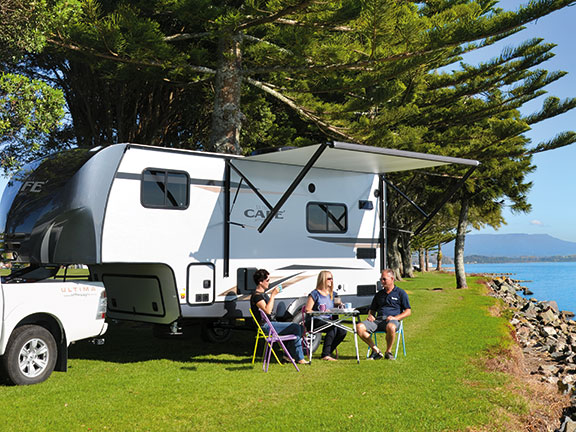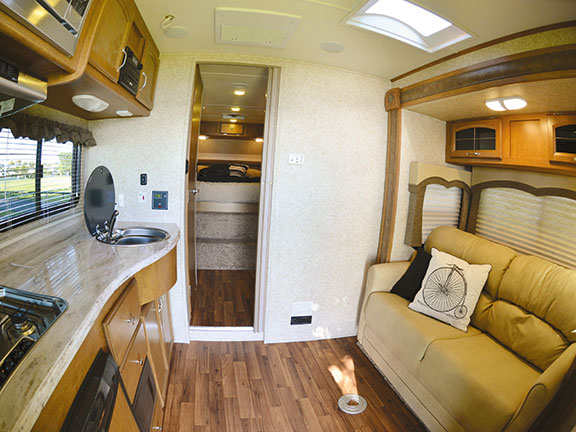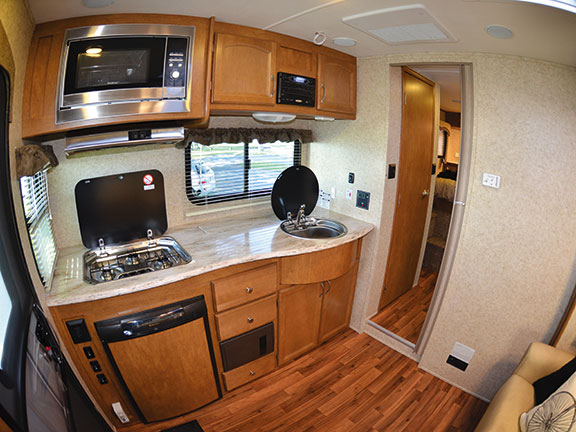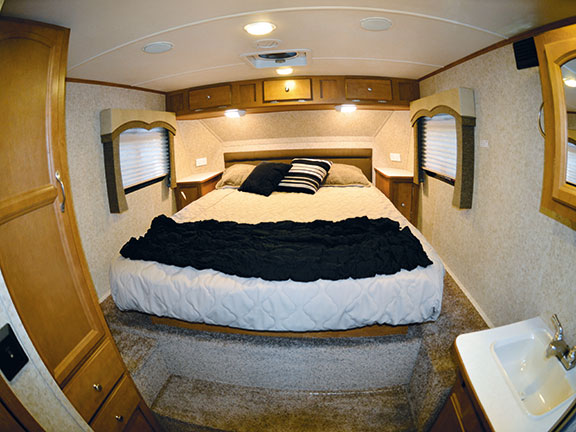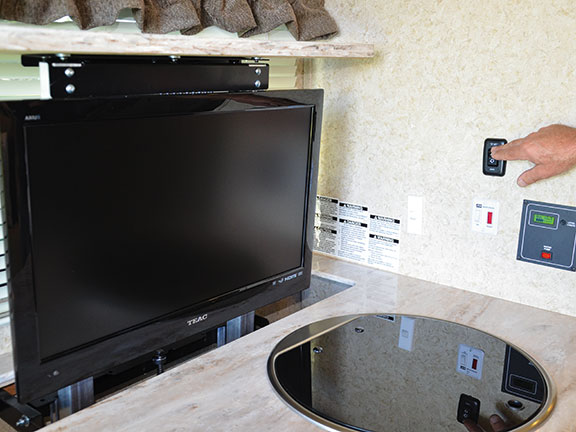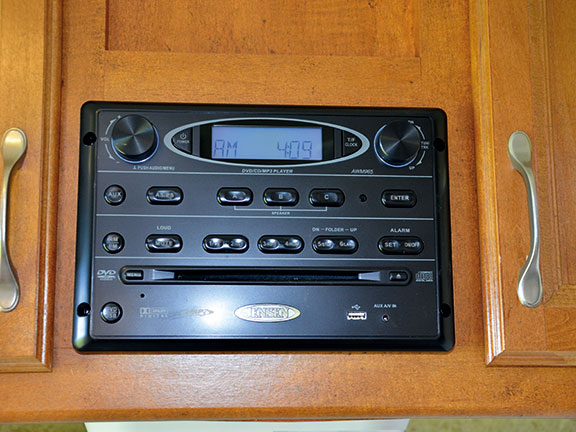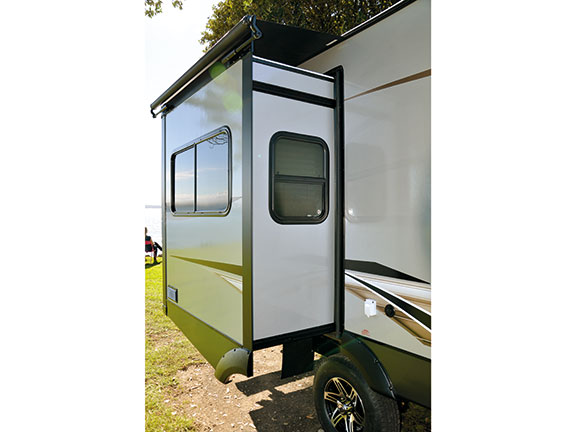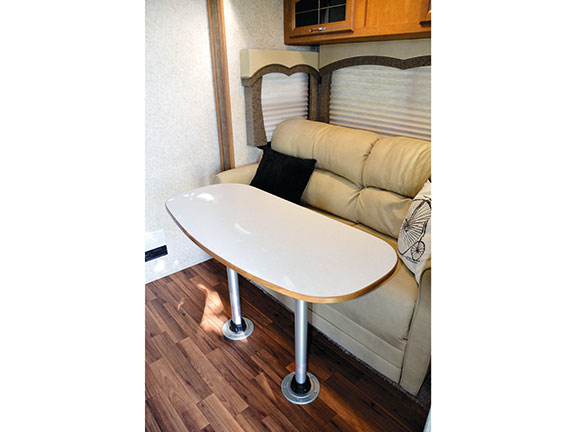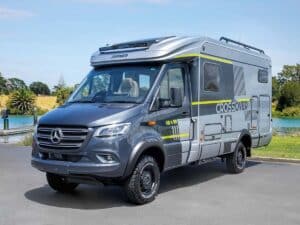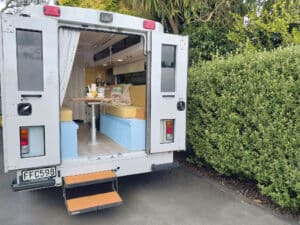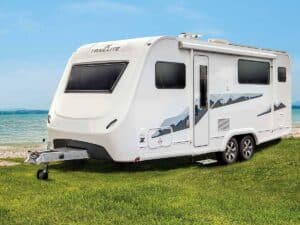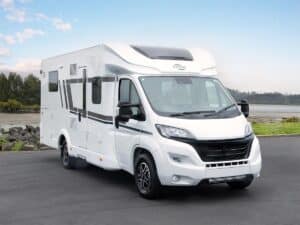The seven-metre Café is the American fifth-wheel manufacturer's latest creation and was designed exclusively for Down Under — it's only available here and in Australia. The fact you can't buy one in the US speaks volumes about the average American RV owner's preferences — towability and manoeuvrability are clearly not particularly important features.
But they certainly are in New Zealand, where the undulating topography and winding roads test both your driving skills and your vehicle's heart. Furthermore, we have a penchant for tucking RVs into cosy, remote spots overnight rather than pulling into motorcamps. Lighter, smaller and more agile are very appealing features — they offer much greater freedom and flexibility when planning adventures.
Even better, because the Café's built specifically for New Zealand and Australia, all electrical fittings/wiring and gas connections are correct and fully compliant — no alternations are necessary. She's ready to hook up and go.
The Café is one of three imported by the Ultima agent — Mt Maunganui's On The Way RV. Towability, I suspect, will become one of its greatest attractions. With the centre-of-effort well forward (typically over the tow vehicle's rear axle), fifth-wheelers are famously easier to tow and manoeuvre into tight spots than caravans with long drawbars. The Café's size and trim weight enhances this attribute.
With an ATM of 2800kg (2100kg dry), it doesn't have to be hitched to a high horsepower, gas-guzzling V8. Suitable tow vehicles include the Nissan Navara, Ford Ranger, Toyota Hi-lux, Holden Colorado, Isuzu D-Max, Mitsubishi Titan and VW's Amarok. I really like the ease of hooking-up — being able to see the hitch mechanism takes the guesswork out of hitting the target.
As a fifth-wheeler, the overall towing length (Café plus vehicle) is about three metres shorter than a typical seven-metre caravan combo, yet it has about the same floor space as a seven-metre caravan. And that's largely a function of the slide-out expanding the lounge area significantly. It's a great feature (more on this shortly).
It's also a rear-entry RV. This might pose a quandary when parking/orientating it. Do you want the door facing the view? Or do you park the Café side-on, so you can sit under the side awning, and resign yourself to walking around the back to fetch another drink? It doesn't bother me, but I'll accept some owners might have liked a side door.
Interior
While the Café is some two metres shorter than its well-established bigger sisters (the nine-metre Classic and Express fifth-wheelers), its presentation is remarkably similar. In fact, the bedroom/bathroom suite (in the rear) is virtually identical — a queen-size island bed with a separate shower and toilet.
It's a fully-carpeted, cosy boudoir illuminated by LEDs and with convenient bedside lockers (and more storage overhead). The bed tilts up for access to a wide, shallow locker underneath.
A small vanity (with mirror cabinet above) is tucked against the side at the foot of the bed, alongside a very generous shower cubicle — lots of space to scrub along to your favourite aria. Immediately opposite is a tall hanging locker and, alongside it, the toilet. As a separate, independent unit, it's spacious — ideal for settling in to read the latest issue of MCD.
There are pre-wired connections for a second TV in the bedroom. A concertina door built into the bulkhead draws out to provide some privacy, separating the bedroom from the rest of the Café.
Lounge/kitchen
For me, the real success of the Café is its lounge/kitchen area — a clever use of space enhanced by the electrically-operated slide-out. The area's serviced by a plush two-seater settee — and as an optional upgrade the standard unit can be swapped for a fold-out bed model. This turns the Café into a logical proposition for a couple with two small children.
A stand-alone oval table services the settee — its pedestals clip into precision-engineered, secure floor fittings. Opposite is the kitchen with its sink, three-burner, stainless steel gas cooker, 90-litre Dometic three-way fridge and a microwave above. The gas locker carries two 4.5kg bottles.
The Corian countertop looks and feels very classy, and its best feature is the 32” pop-up LED TV built into the counter. Stowed in a cavity behind the sink, it's deployed with the push of the button. Mounted above, between the lockers, is the entertainment centre. An AM/FM radio and CD/MP3/DVD player is connected to speakers in the living area, the bedroom and outside.
The standard Café is fitted with a healthy-sized, roof-mounted air-conditioning unit, and when you're freedom camping, it will be driven by two 90-amp-per-hour batteries. Also standard is a wind-out satellite dish. The twin 140-watt solar panels on the roof (an optional upgrade) will help to keep those batteries happy.
All up it's a comfortable, well- finished design with quality fittings and accessories.
What's in a name?
Quite a bit, actually. Café sounds cool, but it's also an acronym for 'compact, aerodynamic, fuel-efficient, environmentally-friendly'.
Compact is obvious, though the RV offers a remarkable amount of internal space for its size. The nose cone in front accounts for the 'aerodynamic' (it greatly reduces drag), but that's also enhanced by the enclosed underbelly to cut bottom wind resistance. That all makes driving easier — and more importantly eliminates heart-stopping seizures from overtaking manoeuvers.
Superior aerodynamics translate into improved fuel-efficiency. Contributing to that is the single axle — it reduces weight and minimises rolling resistance. In fact, tests in Australia show a Café towed behind a 2010 Ranger (dual-cab, manual, 4x4, diesel) returned a highway fuel consumption of around 11L/100km.
The Café's eco-friendliness derives from its extensive use of recycled materials and sandwich foam walls to provide excellent thermal properties — this means less energy on heating, and longer-lasting batteries.
With its streamlined contours and light weight, the Café will give owners a fuss-free driving experience and a great sense of freedom. The ability to take your 4x4 and Café into areas you'd be wary about exploring in a caravan or motorhome holds enormous appeal, and at $88,000, it's not a purchase to bust the bank.
I can see it becoming a popular fixture on our roads. Maybe even the Yanks will grow to like it…
| Specifications |
| Length |
6.95m |
| Width |
2.23m |
| Height (excl. A/C unit) |
3.05m |
| Kerb weight |
2100kg |
| Payload |
600kg |
| Freshwater |
140L |
| Greywater |
120L |
| Blackwater |
120L |
For the latest reviews, subscribe to our Motorhomes, Caravans & Destinations magazine here. 
